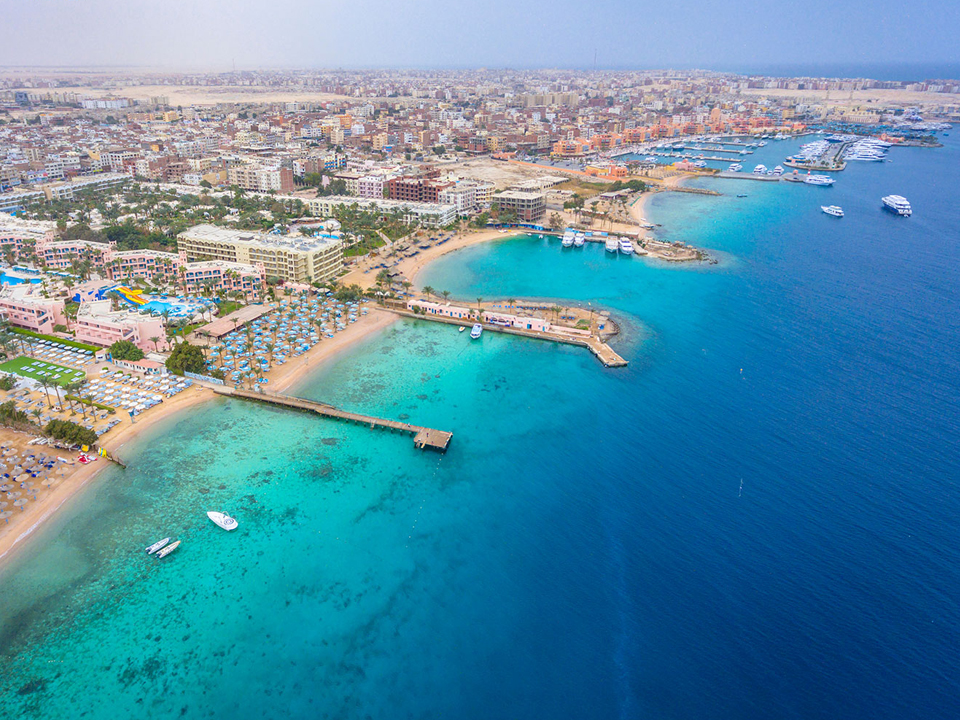Hurghada
With its' mild weather and sunshine almost all year-round, sprawling beaches and exquisite coral reefs, Hurghada is one of the most outstanding tourist cities in Egypt and a major tourist hub for domestic and foreign tourists alike. Its' natural islands make up a virgin environment for a variety of rare flora and fauna, offering a perfect setting for enjoying recreational sports such as land hunting and fishing.
Once just a lay-by for fishermen and now a burgeoning resort town, Hurghada is cuddled between the Sahara and the Red Sea. Plucked from limbo and pushed into the limelight, it's an aquatic wonderland for sailors, divers, sunbathers, and desert dwellers. With historic districts, traditional markets, renowned diving centres, and desert safaris, the town has emerged as an ideal destination for underwater adventures.
Places:
> El Dahar (Old Town)
> El Saqala (City centre)
> Marina boulevard
> Hurghada Museum
> Grand Aquarium
> Mini Egypt Park
> El Mina Mosque
> St. Shenouda's Coptic Orthodox church
When to Go?
With pleasant weather and warm waters, Hurghada is a year-round destination. In summers, Egyptians – from Cairo and Luxor – flock here to escape the heat. The best time to travel in Hurghada is from April to June and September to November. During these periods, vacationers can expect warm sunny weather that is tolerable.
Safety
We consider Hurghada safe to travel. Egypt as a whole is relatively safe to travel to, even more so in Hurghada for the fact that there are many resorts and infrastructure to support tourism. The people in Hurghada are warm and friendly, and can comfortably walk around both day and night. Obviously, common sense prevails and you should not put yourself in a dangerous situation such as being intoxicated or venturing to remote areas alone.
Watersports
Hurghada is known for its extraordinary diving spots in the Red Sea. Marine life in the Red Sea, with lots of coral and colourful fish, is the biggest draw here for outdoor sports enthusiasts. Scuba diving and snorkelling sites around Abu Ramada Island and Giftun Kebir are popular with travellers. Experienced divers can explore historical shipwrecks of El Mina and Rosalie Moller. Many diving centres offer adept training and guided tours, even for advanced divers.For those who are not too keen on diving but still want to discover the fascinating underwater world, Paradise Island offers ideal conditions for exciting snorkelling tours. Soma Bay offers the best possible conditions for serious kite surfing, parasailing, and waterskiing.
Shopping
You can buy many souvenirs from the shops that are spread inside the main town (Sekala high street) and along the beach areas. Also, the old downtown (el Dahar) has a wide selection of bazaars with lower prices than Sekalla. First, remember to haggle, haggle and haggle everywhere except in restaurants and drugstores. You should be able to get 75% off from the price that the seller asks at first. That might vary with different products, so remember to check a few shops for appropriate prices. There are souvenir shops that have fixed prices, mostly in the New Hurghada area. There is no reason to be happy with the fixed price since some times it's more expensive than in other shops. At famous stores like 'Cleopatra', you can find souvenirs, shirts, woodwork, and silver.Senzo Mall, on the airport road, is about 10-minute drive from town. Stores there offer a variety of souvenirs, including artefacts, copper cups and Pharaonic paintings. Vendors tend to drive a hard bargain on products like carpets, jewellery, local species, and leather goods. It also hosts international and local brand stores, a large food court and a kids activities area. Head down to 'New Marina' and Sheraton Road where you can find a traditional bazaar (Souq in Arabic). Often the clothes are counterfeit knockoffs; though you will notice that any shop may post famous trademarks on its banner and yet sell fake garments.
Entertainment and nightlife
The majority of the tourist areas are in the Sekala neighbourhood along the town’s waterfront. Here visitors can find most of the hotels and resorts, as well as the commercial and entertainment district. The Marina boulevard contains more than eighty shops and boutiques, over a dozen restaurants and seven bars. It also features unusual entertainment like the “bungee cannon” ride that launches adventures guests high into the air above the harbour.The Sekala area is a network of interconnected buildings, and guests can wander freely through the shops and cafes. Many resorts and hotels also have their own discos and nightclubs, many with weekly shows or planned events that welcome guests and hotel patrons alike. Some of the resorts plan less youthful and exuberant nighttime activities, which include local musicians and dancers, floor shows and even some lectures about the history and culture of Egypt.
Getting around
Uber and Careem both have presences in Hurghada. They are reasonably priced and convenient, sparing you the incessant haggling required for taxi rides. You might find Careem and Uber a little more expensive; however, you get a more comfortable ride with a better vehicle, clean driver, and air conditioning. The primary means of public transport in Hurghada is white minivans (Toyota Hiace) called 'microbus', and they have established routes. Locals are the primary users, but it's easy for foreigners to use too. It costs about 2 Egyptian pounds to regular route destinations, and 5 Egyptian pounds from Sherry Street to Senzo Mall and Cora.Note that they stop wherever they need them to along the route. The signs for the bus routes are in Arabic so ask someone which bus is going where you want to go. They will direct you accordingly and double-check with the driver for your destination before getting in to be sure it's going where you want to go.


